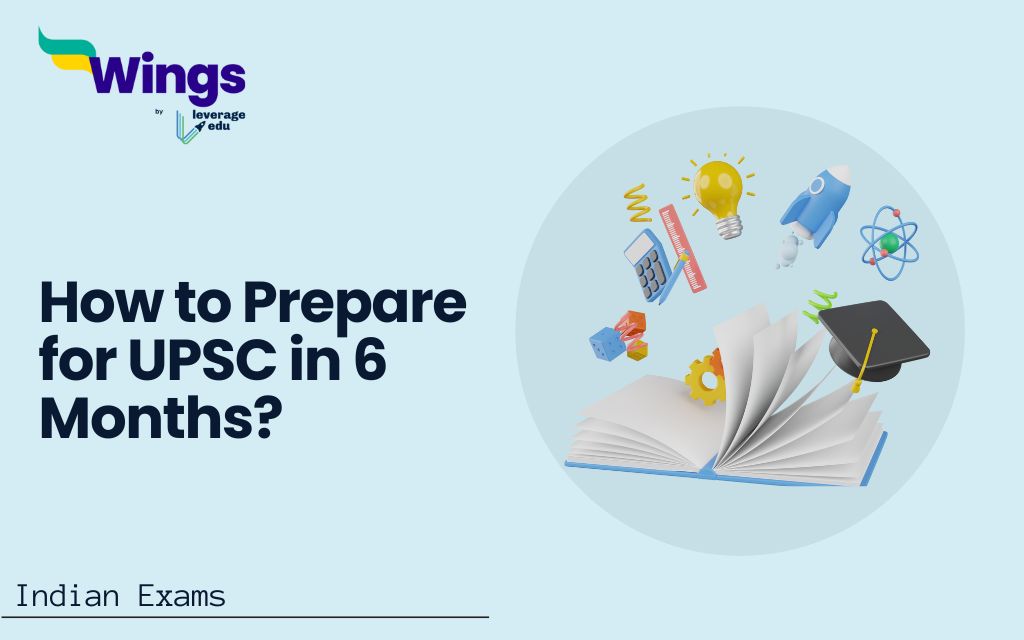The UPSC Civil Services Exam (CSE) is the exam held for prestigious administrative positions in India. It’s no secret that cracking this exam requires dedication and consistent preparation. But what if you only have six months? While it’s quite challenging, it’s not impossible. Read this article to know how to prepare for UPSC in 6 months.
UPSC 6 Month Study Plan
Here we have listed some of the steps to help you crack the UPSC exam in a short time frame of 6 months.
1. Understand the Exam & Syllabus
Before starting your preparation, thoroughly understand the UPSC CSE exam pattern. The exam consists of three stages: Prelims (objective), Mains (descriptive), and Interview. You’ll need to plan for each stage differently.Download the official UPSC syllabus and analyze it thoroughly. Focus on high-weightage areas and identify topics that overlap across sections. This will help you optimize your study time.
2. Choose Study Material Wisely
Don’t get overwhelmed with so many resources available in the market. Stick to standard, well-regarded sources recommended by toppers and coaching institutes. Here’s a resource list suggested by many toppers:
- Form a strong foundation with NCERTs from Class 6th to 12th for subjects like History, Geography, Polity, Economics, and Science.
- Supplement NCERTs with subject-specific reference books like M. Laxmikanth for Indian Polity or Ramesh Singh for Indian Economy.
- Stay updated with current events through magazines like Yojana or Kurukshetra. Utilize online resources like the Press Information Bureau (PIB) website for government initiatives.
- Familiarize yourself with the exam pattern and question style by solving PYQs extensively. Use mock test series offered by coaching institutes or online platforms.
3.Prepare a Timetable and Stick to It
Six months fly by quickly. A well-structured timetable is what you need ultimately to succeed. Allocate specific time slots for each subject with special focus in revision and current affairs. Here’s a possible approach:
- Dedicate your fresh mornings to understanding new concepts from textbooks or reference materials
- Schedule revision sessions to revise what you learned in the morning.
- Practice mock tests, analyze your performance, and identify areas for improvement. Dedicate some time for current affairs in the evening as well.
4. Prioritize Important Topics:With limited time, prioritize effectively. Focus on core areas with high weightage in the syllabus. For example, Indian Polity, Economy, and Science & Technology are important for the Prelims stage.
5. Learn the Art of Note-Making::Effective note-making is a game-changer. Don’t just highlight – actively engage with the material. Summarize important points, create flowcharts or mind maps, and use visual aids for better retention. Concise notes will be invaluable during revision.
6. Use Online Resources:The internet is a full of resources. Use online platforms for video lectures, topic-specific explanations, and current affairs updates. Explore free resources offered by coaching institutes or educational websites.
7. Mock Tests and Self-Evaluation:Regularly take mock tests to gauge your understanding, identify weak areas, and improve time management skills. Analyze your performance after each test – understand why you got questions wrong and revise those concepts thoroughly.
8. Stay Updated on Current Affairs:Current Affairs hold a lot of weightage in both Prelims and Mains. Develop a habit of reading newspapers like The Hindu or The Indian Express daily. Focus on national and international issues with relevance to the UPSC syllabus.
9. Group Discussions and Answer Writing Practice :For the Mains exam, polish your answer writing skills through practice. Join online or offline study groups for discussions on current topics and practice writing answers following UPSC guidelines.
10. Maintaining Mental & Physical Well-being:The UPSC journey can be stressful. Prioritize your mental and physical health. Schedule breaks for relaxation, exercise regularly, and eat healthy foods. Techniques like meditation or yoga can help manage stress and improve focus.
Time frames for Effective UPSC Preparation
This table provides a clear breakdown of activities and timeframes for effective UPSC mains preparation over 6 months, ensuring comprehensive coverage and structured study habits.
| Phase | Activities | Timeframe |
| Phase 1: Before Prelims | – Consolidate understanding of core subjects: Economic Development, Environment, Governance, etc. – Cover 40% of optional syllabus. – Review past 10 years UPSC mains question papers. | Before UPSC prelims exam (approx. 2 months) |
| Phase 2: Post Prelims | – Shift focus entirely to UPSC mains. – Allocate time to each of the 7 papers. – Enhance analytical and writing skills through regular practice.- Complete remaining optional syllabus. – Solve previous year papers of compulsory language papers. | 3-4 months after UPSC prelims exam (intensive phase) |
| Overall Strategy | – Maintain discipline and consistency. – Practice answering questions in exam-simulated conditions. – Prepare for two papers on the same day scenario. – Prepare for UPSC interview (Personality Test) after mains. | Throughout the 6-month period. |
Related Blogs
FAQs
Yes ,6 months are enough for UPSC preparation if done in a planned manner.
Aspirants who prepare for UPSC in a dedicated and planned manner are likely to clear UPSC in 6 months
Yes,you can pass UPSC in 3 months .Remember that it needs a lot of hard work and planning ..
This was all about “How to Prepare for UPSC in 6 Months?”. For more such informative blogs, check out our UPSC Exams Section, or you can learn more about us by visiting our Indian exams page.


 One app for all your study abroad needs
One app for all your study abroad needs












 60,000+ students trusted us with their dreams. Take the first step today!
60,000+ students trusted us with their dreams. Take the first step today!